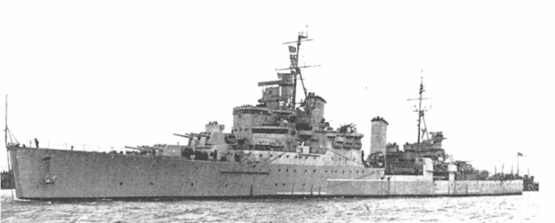- Author
- Ashmore, Edward, Sir, Admiral of the Fleet, RN
- Subjects
- Ship histories and stories
- Tags
-
- RAN Ships
- None noted.
- Publication
- June 2005 edition of the Naval Historical Review (all rights reserved)
The following account, taken from the memoirs of Admiral of the Fleet Sir Edward Ashmore RN, is an inspiring story of his experience as a midshipman at the time of the growing antagonism between Japan and Western nations prior to the outbreak of WW2. Sir Edward’s autobiography ‘The Battle and the Breeze‘ was published by Sutton Publishing Ltd. in 1997 in association with the Royal Naval Museum, Portsmouth UK, and is a detailed and fascinating book of his highly successful career in the Navy mid-twentieth century. (By kind permission of the publishers).
I REJOINED HMS BIRMINGHAM (light cruiser) which sailed to Manila for a change of weather before going to Wei-Hai-Wei ((RN summer Fleet Facility in northern China until WW2)) once more as guardship. It was bitterly cold at Wei-Hai-Wei, the Kuma (Japanese cruiser) was there, and the chief recreation ashore was skating on the pond. Our sailors had a monopoly of the Fleet canteen, and we had the Officers’ Club to ourselves. There was a hospital on the island, run by the Navy, and the resident officer in charge of the whole affair was a surgeon commander called Pomfret. He had his family with him, and it must have been a rather pleasant job, despite the Japanese who periodically came to see him. We were working a winter routine, which meant getting up later in the morning (I don’t think we started until 8am, 7.30 perhaps), and we ceased work soon after lunch. It was a welcome change from the busy life and enervating climates we had become used to in the south.

Orders to raise steam
The idyll was interrupted by sudden orders to raise steam and proceed with all despatch to Tsingtao ((Former German China Squadron base up to WW1 when it was captured by the Japanese.)). I landed at about 8.30pm to tell the officers ashore what was going on, and all came off by a special boat sent in two hours later, leaving several wondering wives to watch us sail. The next morning we anchored between a Japanese destroyer, a Norwegian merchant ship and the British-registered SS St Vincent de Paul, which had been arrested by the Japanese on the high seas and ordered into Tsingtao. IJS Ashigara (Japanese heavy cruiser) was also in harbour. St Vincent de Paul‘s illegal arrest was the reason we had been despatched.
An officer went over to find out from her master his version of what it was all about, and came back and reported. I then went over to see the Master and tell him that a boat would be sent for him at 11am and he was to bring the ship’s log, a written statement of his complaints and any other evidence. I was prevented from going alongside by a Japanese customs launch, but was able to talk to the Master, shouting up to him on the bridge. I was eventually allowed aboard, being heavily photographed by the Japanese who were lying off. By the time I got back to Birmingham, however, the Japanese had hoisted a quarantine ((International Code flag ‘Q’ – known as ‘Yellow Jack’)) flag on board the ship, so the Master was unable to leave for Birmingham.
Arguments went on most of the day, with the Japanese officers going to and fro, the Consul-General coming off from shore and the Norwegian Consul coming too. Eventually, I was sent for by the Commander, who said that we were going to place an armed guard on board St Vincent de Paul for the night and a midshipman volunteer was wanted to take charge of it. This was easy, and I volunteered at once. It sounded as though it might be interesting, and sure enough, before it got dark, I drew a pistol, was sent with four armed ratings and a petty officer (one of the ratings being a signalman), with instructions to make certain that the Japanese did not board the ship in strength during the night. If they tried to do so, I was told to refer them to Birmingham and if they refused to go away I was to signal for assistance.
I hoisted the gangway so that not even a Japanese monkey could get aboard, and posted armed sentries. Captain ‘Daddy’ Brind (CO HMS Birmingham), who was faced with a potentially serious international incident, took a very strong line and told the Admiral in Ashigara that he was going to sail in the morning and take St Vincent de Paul with him. Early in the morning, when I had to lower the gangway to let a telegraphist rating from Birmingham come on board, a Japanese customs launch came alongside at once, and three officials came up the gangway demanding to see the Master. I met them at the top with my revolver, not brandished but handy. It was a long argument, I kept referring them to Birmingham, saying, ‘Go and see my Captain in the Birmingham,’ but they refused to do that.




